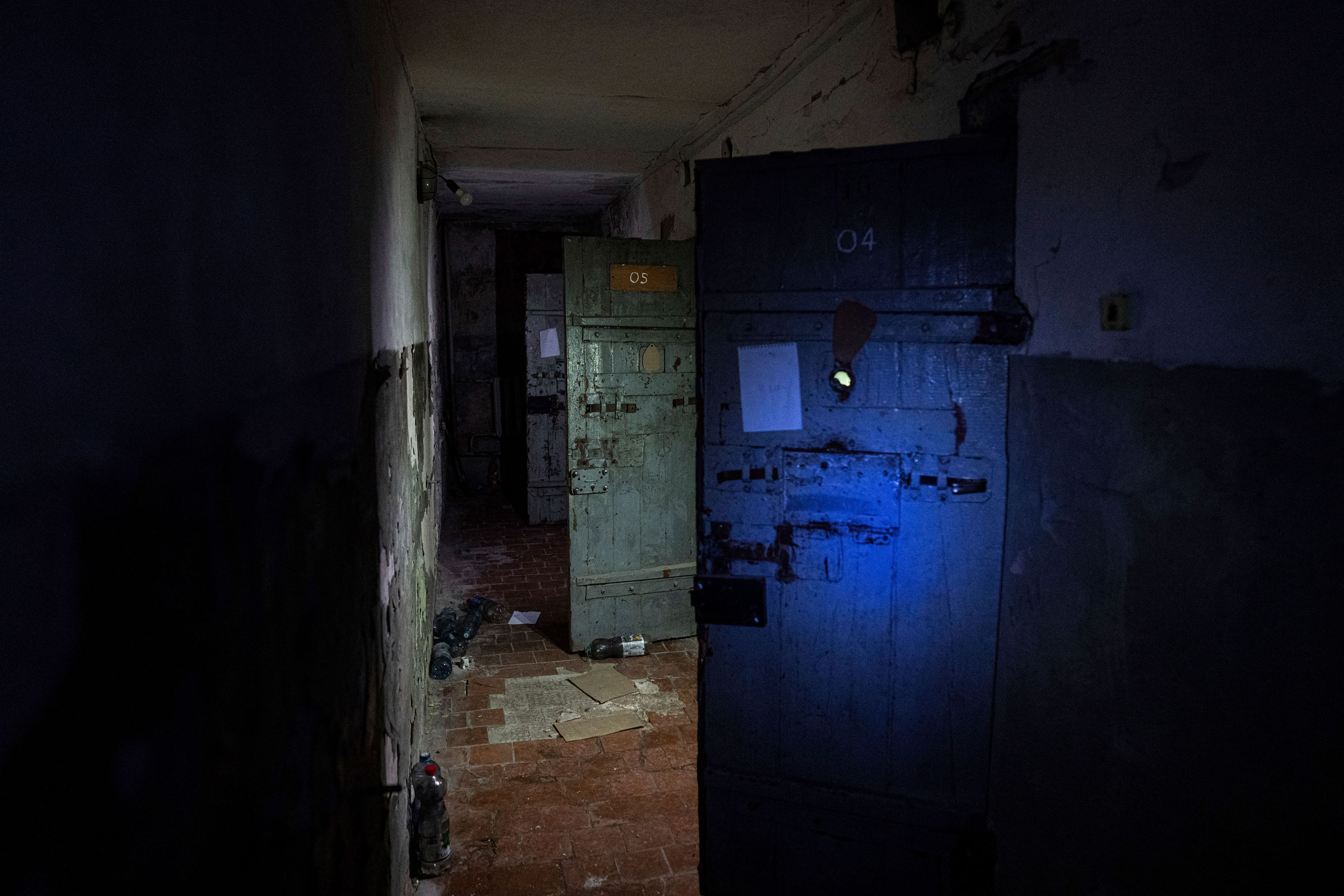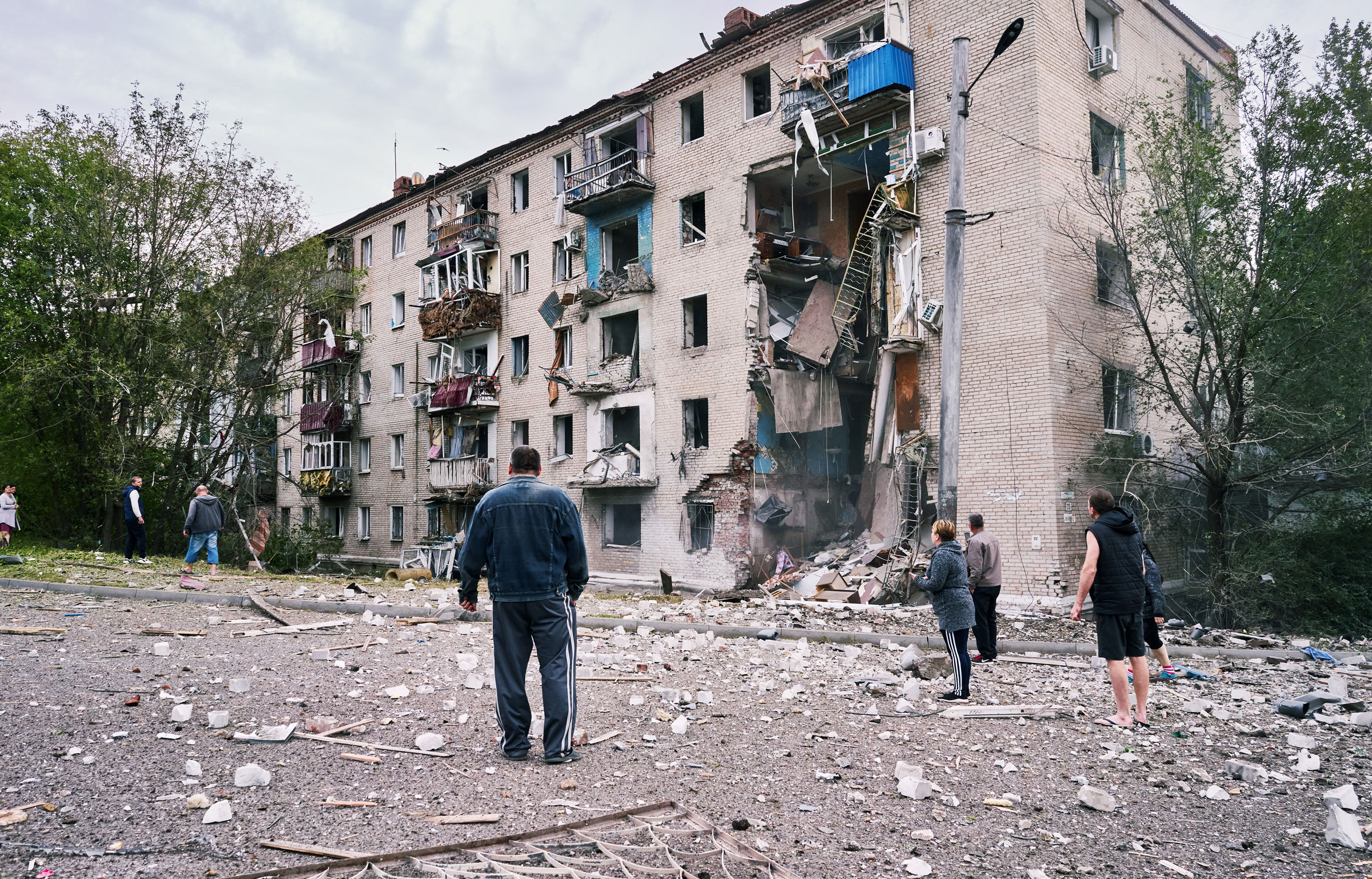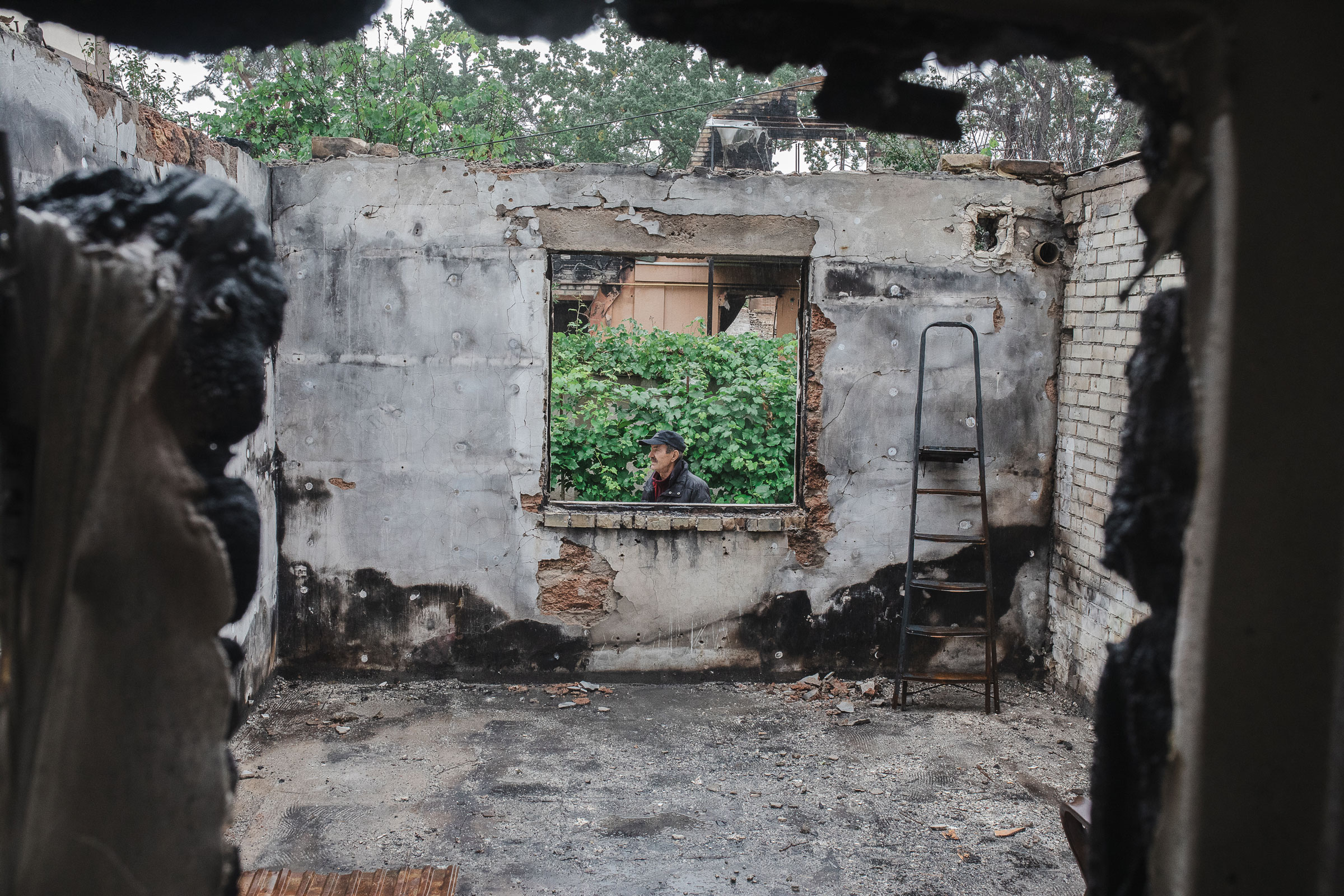As Putin gave his latest rant of resentment in the Kremlin, hinting at Cold War style nuclear threats, medieval holy war with the “satanic” West, and restoring the USSR by annexing slices of Ukraine, the Ukrainian army continued liberating parts of the country he was claiming to annex. As Ukrainian forces have freed people over the last few weeks in the Kharkiv region from Russian occupiers, they were greeted by relieved locals. Many told how they spent weeks, sometimes even months, hiding in their cellars from the Russian invasion. Such cellar stories are one of the repeating leitmotifs of the invasion.
Since February some Ukrainians have retreated to cellars for safety, seeking shelter from indiscriminate bombardment, ears attuned to measuring the proximity of each missile blast, bodies reverberating with every tremor. Across Ukraine there have been underground hospitals and underground schools, underground TV studios and underground concerts. Some 2500 civilians hid in the labyrinthine passages and halls underneath the vast, four square mile factory complex of Azovstal in Mariupol, as the Russians obliterated the city above them.
There are grimmer cellars, where Russian troops interrogate, torture, tie up, and rape. In recently liberated Izyum victims speak of torture cellars where they were given electro-shocks, had gas masks put on their faces and had flashlights shone in their face during interrogation. Such torture chambers are so systemic, the forms of torture so consistent, they can’t just be the work of soldiers breaking bad: torture is Russian policy. Many more victims can’t speak: a mass grave with over 400 bodies is currently being exhumed.

In the village of Yahidne, in northern Ukraine, Russian soldiers drove three hundred villagers in the cellar beneath the school, from infants through to old-age pensioners. Without medical care some died. When I asked one of the women who had been imprisoned in Yahidne how one imagines what’s going on in the rest of the world when locked underground, she explained how her world shrank to four walls, the little walks she was permitted to take outside, and the mood of the soldiers guarding them.
Read More: How Ukraine Turned the Tide of the War
It was the Ukrainian journalist Andrii Bashtivoi, now a soldier at the front of the counter-offensive, who in the opening weeks of the invasion first turned my attention to how cellars were one of the important symbols of this war. They are emblematic of how Russia wants to imprison a whole country, trap and confine it, the physical manifestation of Russia’s war aims—and its motivations. But what precisely is this cellar that Russia wants to drive Ukraine into? What lurks in the basement of the Russian mind?
Ukraine at war is a territory where the literal and the metaphorical meet, where abstract words take on a bloody reality, and where physical objects swell with symbolism.
Whenever I cross into Ukraine the very air seems to thicken with meaning. As I leave behind the Polish border with its stalls of charities helping refugees, pass through passport control and emerge from the long, zig-zag, wire-fenced corridor of customs I enter a dimension where cliches turn into lived experience.
“Fighting for democracy” is something people do in Ukraine every day, laying down their lives for the right to live in a society where their voice matters. Russia kills and arrests elected officials and imposes violent dictatorship wherever it occupies.
“Civil society,” that web of horizontal social interconnections whose loss is always being lamented in the U.S., actually exists here—citizens band together to build city defenses, clean up the debris after missile hits, nurse the wounded and orphaned. Ukraine reminds what “family values” really mean: the whole country fights like one great family.
“Patriotism,” “sovereignty”—terms which have become so wasted in the West, are imbued with meaning in Ukraine.
But even as Ukrainians make talk about “democratic values” tangible, so the physical world here also pushes into the metaphorical, into the cellars.

In Kharkiv in July, in the far East of Ukraine, I was in the cellar of my colleague, the journalist Natalia Kurdiokova. Since an artillery strike knocked out the toilet of her apartment she has moved underground. It’s a comfortable cellar that she was already using as an office before the war. There’s a broadcast studio, bean bags, bright lighting, a kitchen and a bedroom.
At night we listened to the noise of artillery rolling over Kharkiv. The Russians failed to take the city in Spring, so now they were randomly shelling the city and lobbing random missiles in order to terrorise the population. The week I was there the Russians hit two buildings in the centre, killing five and injuring many others. On local news I watched the clip of a man whose wife was killed as they went out shopping. He knelt on the street by the bloodied body bag which contained her corpse, wept, ripped it open and began to kiss the dismembered limbs. A few weeks after I left the Russians hit a hospital for the hard of hearing. 21 died. Natalia told me she heard the missile as it gave a high pitch scream and tore the air above the city. As the Ukrainian forces liberated the Kharkiv Oblast and pushed past, Russia increase long range missile attacks on the city as punishment and vengeance.
Natalia and I were researching how people survive psychologically under such terror. In the first months of the invasion thousands Kharkivchani moved into the metro stations, like Londoners during the Blitz. Some became so paralyzed by fear they refused to emerge for months. Natalia described how even when the initial bombardment subsided she would see people standing at the bottom of the escalators, paused in silent panic, unable to ride up.
Natalia recalled how much she used to enjoy climbing on her roof to gaze out over the city and beyond.
“They want to take away our sense of the horizon. Of the sky.”
Climbing up high always inspires a sense of possibilities. The barrages of Russian artillery have made such ascents impossible. Russia is not only forcing Ukrainians physically into cellars, it’s trying to do so mentally as well: to rob Ukrainians of their sense of a future, of horizons, of openness.
In Putin’s rambling, aggressive, misinformed speeches about Ukraine he always harps on a false history, claiming that Russia and Ukraine are one people, that Ukraine belongs to Russia. The speeches are also interesting for what they leave out. There’s no attempt to deal with the oppressions of the Russian and Soviet past, the way the Kremlin repeatedly colonizes, ethnically cleanses, deports, starves and mass murders other nations, and the way it kills and arrests and humiliates masses of its own people too in labour camps, Gulags, and the killing cellars of the KGB. Russia is a country that makes no effort to make sense of, define who was responsible, ask for forgiveness and move on from its legacy of mass murder and institutionalized sadism. There isn’t even a museum any more to the tens of millions killed in Stalin’s gulags, let alone to Russia’s colonial crimes. Right before the current invasion the NGO Memorial, which tried to document Soviet crimes, was shut for being a “foreign agent.”
Read More: Ukraine Is Our Past and Our Future
All this horror stays locked up in the cellar of the Russian mind, a history of humiliation played out in a sado-masochistic torture cellar. And it’s this cellar the Russians want to lock the Ukrainians into. Russia’s current invasion replays Soviet-style “filtration” camps and mass executions, deportations, mass destruction of cities, show trials and crass propaganda. Just like in many centuries past Russia destroys Ukrainian language school books, arrests and “disappears” anyone who stands up for Ukrainian language and letters. In its stead Russia recreates a Soviet Dismaland of crass propaganda with marching pioneers and Soviet style songs, Soviet insignia and Soviet posters.
If we didn’t manage to escape the past—is the message—you have to suffer it with us, too. Russia wants to lock Ukraine into its cellar of horrors and force it to replay the past in a twisted fantasy where the mass murders, war crimes, crimes against humanity, and intent to genocide are all very real.
It’s striking how little mention of the future there is in the Kremlin’s propaganda. There’s only vengeance, warped nostalgia for the USSR, a mythic, cruel “Russian World”—and resentment. The Russian project has failed, so the aim now is to bring everyone down to its own level, drag all down to its cellar. “How dare you live so well” read a piece of graffiti scrawled by Russian soldiers in the suburbs of Kyiv.

Ever since the first weeks of the war Ukrainians have been asking the West to “protect our sky”: whether through enforcing a no fly zone, or at least by providing Ukraine with fighter jets. The sky needs protecting literally from Russian planes and missiles, but also figuratively for Ukraine’s right to define its own future. Wein the West did far too little to help, refusing to give planes and more sophisticated air defence systems. Now Ukraine is fighting for its own skies—and our future. Russia wants to lock Ukraine into the cellar of its past, but it wants to drag Europe down there too, to return us to a world where bullying states humiliate small ones—a world we thought had passed. It’s using energy to blackmail and break Europe and make the free world kiss its boots. It uses nuclear threats to bring back the nightmares of the Cold War: Putin wants a cheaper, nastier remake of the Cuban Missile Crisis. As Anton Barbashin, a political analyst and editor of Riddle, noted as he watched Putin’s surreal speech announcing the annexation of parts of Eastern Ukraine on September 30, Putin was trying to return the world to the 1970s: the USSR is on par with America; Moscow controls half of Europe. Until we learn to fight back with the spirit of Ukrainians we will risk losing our future, too.
Whenever I’m in Ukraine I’m always glancing up at the sky with a mix of fear and hope. Every distant rumble of thunder makes me start: is that a missile? Like some medieval villager, the sky seems full of portents, danger, hope and symbols. Whenever I leave again, walking back across the border into Poland, the return to a zone of safety seems so cruel. Just a few hundred meters away is the zone of danger, where the innocent are being slaughtered every day. Here the trees, grass, birds all look the same but everything is different, both more secure and less alive, below a meaningless sky.
More Must-Reads From TIME
- The 100 Most Influential People of 2024
- How Far Trump Would Go
- Scenes From Pro-Palestinian Encampments Across U.S. Universities
- Saving Seconds Is Better Than Hours
- Why Your Breakfast Should Start with a Vegetable
- 6 Compliments That Land Every Time
- Welcome to the Golden Age of Ryan Gosling
- Want Weekly Recs on What to Watch, Read, and More? Sign Up for Worth Your Time
Contact us at letters@time.com